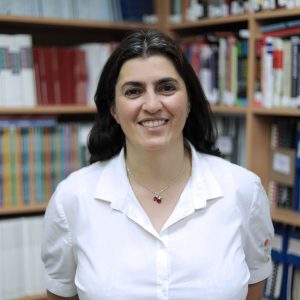
Yevgenya Jenny Paturyan specializes and has interest in the sphere of civil society, political culture, volunteering, democratization of post-communist countries, research methodology and corruption. She received her PhD in Political Science from Jacobs University Bremen. Prior to joining AUA, she worked at Eurasia Partnership foundation and at Caucasus Research Resource Centers – Armenia. She is the team leader of a four-year research project about Armenian civil society and has authored publications in peer-reviewed journals. Dr. Jenny Paturyan is an AUA PSIA alumna.
Education, Degree
PhD, Jacobs University Bremen
Office location
123W, Paramaz Avedisian Building
Email
[email protected]
Phone
(+374 60) 61 26 75
Office hours
Varies depending on teaching schedule. Also by appointment.
Areas of research and teaching specialization
Democracy and Democratization, Civil Society, Corruption, Research Methodology
Courses taught at AUA
Ugrad:
- Introduction to Political Science
- Introduction to Political Inquiry
- Political Ideologies
Grad:
- Research Methods in Political Science
- Public Policy Analysis
- Civil Society and Social Capital
- Comparative Politics
Research Activities/Projects
- “Armenian Civil Society after 20 Years of Transition: Still Post-Communist?”
- “Civic Activism as a Novel Component of Armenian Civil Society: New Energy and Tensions”
Publications
- Armenian Civil Society: Old Problems, New Energy After Two Decades of Independence. Springer International Publishing, 2021 (co-author: Valentina Gevorgyan)
- “Re-emerging Civic Activism: Restoring the Ecosystem of Armenian Civil Society” in Civil Society in the Global South, ed. Palash Kamruzzaman, London and New York, Routledge, 2018, 54-70 (coauthor V. Gevorgyan).
- “Armenian Civil Society: It is Not All About NGOs.” Caucasus Analytical Digest 73: 2-5, 2015.
- “Is ‘Googling’ a Technique? What the Internet Can Tell Us about the Non-Governmental Sector in Armenia.” Haigazian Armenological Review 34 (July): 257–67, 2014. (coauthors Valentina Gevorgyan, and Mariam Matevosyan).
- “Trust towards NGOs and Volunteering in South Caucasus: Civil Society Moving Away from Post-Communism?” Southeast European and Black Sea Studies 14 (2): 239-62, 2014 (coauthor V. Gevorgyan).
- “(Dis)Trusting People and Political Institutions in Armenia.” Caucasus Analytical Digest 31: 6-10, 2011.
- Civil Society and Democracy: Disentangling Mutual Influences. VDM Verlag Dr. Müller: Saarbrücken, 2011.
- “Perceptions of Corruption in Armenia: Growing Disappointment and Detachment?” In Adam Hug (ed) Spotlight on Armenia. London: The Foreign Policy Centre. Pp 29-35, 2011 (coauthor Jrbashyan Nairuhi).
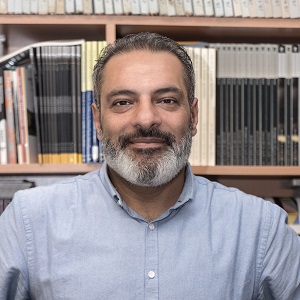
Asbed Kotchikian joined AUA after a twelve-year of teaching at the Global Studies Department at Bentley University. Before joining Bentley University he was the Assistant Director of International Affairs Program and assistant professor of Political Science at Florida State University. Between 2000 and 2002, Dr. Kotchikian was a visiting professor in Armenia teaching at Yerevan State University, Brusov State University of Languages and Social Sciences and the Gyumri branch of Armenian State University of Economics. For nine years (2008-17) he was the editor-in-chief of the peer-reviewed Armenian Review journal. Between 2011 and 2019 Dr. Kotchikian was the academic coordinator of Armenia Higher Education Initiative (AHEI) which organized summer courses in social sciences and humanities methodology retraining for graduate students in Armenia focusing on students from universities outside of Yerevan. During the last 20 years, Dr. Kotchikian has traveled extensively in the Middle East (Iran, Iraq, Israel, Jordan, Lebanon, Syria, and Turkey) and former Soviet Union (Armenia, Azerbaijan, The Baltics, Belarus, Georgia, Russia, and Ukraine). He has written, lectured, presented, and organized conferences on foreign policies of small and weak states, questions of identity and diasporas, and regional developments in the Middle East and Eurasia. In recent years his research on minorities has taken him to Iraq (Kurdistan in 2015) and Syria (2014 and 2019). Apart from his academic/scholarly research, he is also a freelance consultant on de-radicalization, civil society and judicial reforms working with organizations such as Council of Europe and the European Union on projects in Armenia, Belarus, Georgia and Ukraine. Dr. Kotchikian received his undergraduate degree in Political Science and Public Administration from the American University of Beirut (AUB) after which he continued his graduate studies at Boston University obtaining his PhD in 2008 (with a dissertation work on the foreign policy of small states focusing on Georgia and Armenia).
Education
PhD. Boston University
BA American University of Beirut
Areas of Research and Teaching Specialization
Foreign policy making, diasporas, small states in the international system, terrorism, governments and politics in the Middle East and Eurasia.
Courses:
Ugrad courses:
Comparative Politics
Comparative Politics
Political Ideologies
Grad courses:
International Organizations & Global Governance
Russian Politics
Middle East Politics

Uroš Prokić specializes in acculturation models, autonomy policy, and issues of national identity in the ex-Yugoslav context. He is particularly interested in the manner in which institutions steer national groups’ attitudes and behaviors. He also focuses on normative issues related to governance and public administration. Dr. Prokic received two BA degrees in Philosophy and Religion from the American Public University, and an MA degree in International Studies from the University of Sydney. He holds a Ph.D. in Public Affairs and Policy from Portland State University (Oregon). Uroš Prokić was previously a researcher and political science lecturer in the Mark O. Hatfield School of Government at Portland State University, teaching classes in Theories of Comparative Politics, War and Morality, Nationalism, International Politics, International Organizations, and European Politics. His expertise lies in the cross-section between political theory, comparative politics, and international relations.
Education
Ph.D., Portland State University (Oregon), USA
MA, University of Sydney, Australia
BA, American Public University, USA
Office location
135W, Paramaz Avedisian Building
Email
[email protected]
Phone
(+374 60) 61 26 72
Office hours
Thursdays: 12:00-14:00
Wednesdays: 17:00-18:30
Areas of research and teaching specialization
Acculturation models, Minority nationalism, Autonomy policy, Development in ex-Yugoslav space
Courses currently taught
Ugrad:
- Introduction to Politics & Governance
Grad:
- Public Policy Analysis
- Development Policy & Strategy
- Economics for Political Science
Publications:
Recent publications include “How Has Religiosity Influenced the Restrictiveness of Marriage Immigration Policy in Serbia, Denmark, and the United States?” (Hatfield Graduate Journal of Public Affairs) and a book review of Marko Grdešić’s text entitled “The Shape of Populism: Serbia before the Dissolution of Yugoslavia” (Journal Southeastern Europe).

Brian A. Ellison is Dean of the College of Humanities and Social Sciences and Professor of Political Science at the American University of Armenia. He previously served as Director of the Martin School and founding Chair of the Department of Politics and Philosophy at the University of Idaho, as Chair of the Department of Government and Justice Studies at Appalachian State University, and as Director of Master of Public Administration programs at the University of Idaho, the College of Charleston, and Missouri State University. Professor Ellison has served as a visiting professor at the University of Political Science and Law and at Liaoning Normal University in China, as a Fulbright Senior Scholar in Bulgaria, Fulbright Hayes Scholar in Bulgaria and Turkey, as visiting Professor of International Relations at St. Petersburg State University in Russia, and as a higher education consultant for the Open Society to Yerevan State University in Armenia. Dr. Ellison’s research focuses on public administration, local government, and economic development and has appeared in journals and edited volumes, including Policy Studies Journal, Natural Resources Journal, Administration and Society, International Journal of Public Administration, State and Local Government Review, Environmental Management, Publius: The Journal of Federalism, Policy Studies Review, American Review of Public Administration, Public Administration Review, and others. Professor Ellison received his PhD in environmental politics and policy from Colorado State University, and Master of Public Administration, Master of Arts in American Studies, and Bachelor of Science in psychology from the University of Wyoming.
Education
Ph.D., Colorado State University
Office location
MB Room 504M
Email
[email protected]
Phone
(+374 60) 61 2503
Office hours
By appointment
Areas of research and teaching specialization
Economic Development, Local Government Administration, Environmental Politics
Courses currently taught
Ugrad:
- Public Administration
- Introduction to US Government
- Development Policy
Grad:
- Development Policy and Strategy
- Economics for Political Science
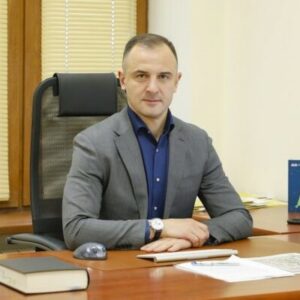
Education
Dr. Philosophy (History), University of Bergen, Norway
Candidate of Historical Sciences, Institute of Oriental Studies, NAS, Yerevan
MA, Lund University, Sweden
BA, Yerevan State University, Armenia
Office location
105W, Paramaz Avedisian Building
Email
[email protected]
Phone
(+374 60) 61 26 70
Office hours
Mondays 12:00-1:00 pm
Areas of research and teaching specialization
Turkish domestic and foreign policy, Regional Security, Conflicts in the post-Soviet Space
Courses taught at AUA:
Ugrad:
- Survey of Regional Politics
Grad:
- Caucasus Regional Politics
- Security Policy
- Armenian Politics
- Middle East Politics
Research Database IDs
ORCID: 0000-0002-2212-0391
SCOPUS Author ID: 36599336300
Researcher ID-N-4267-2017
Research Activities/Projects
- SCOPE – “Religion and soft power: Religious Communities in the South Caucasus as Objects of External Influences”
- NUPI – “Research Beyond the Ivory Tower: Policy and Communication Training for University Teams”
Selected Publications
Monographs
- Komünizm Gözünden Kemalizm: Türkiye’nin Dönüşümüne Sovyet Yaklaşımları. Istanbul. İletişim. 2023.
- “Turkey, Kemalism, and the Soviet Union: Problems of Modernization, Ideology and Interpretation”, New York & London. Palgrave Macmillan. 2019.
Reviewed in:- Sakarya, Sumeyye. (2021). Turkey, Kemalism and the Soviet Union: Problems of Modernization, Ideology and Interpretation, written by Vahram Ter-Matevosyan, The Soviet and Post-Soviet Review (published online ahead of print 2021).
- Hryhorii Mavrov. (2021) Turkey, Kemalism and the Soviet Union: Problems of Modernization, Ideology and Interpretation, written by Vahram Ter-Matevosyan, Insight Turkey, vol. 23, no. 1. pp. 252-254
- Mohammed Alrmizan (2020) Turkey, Kemalism and the Soviet Union: Problems of Modernization, Ideology and Interpretation, written by Vahram Ter-Matevosyan, Turkish Studies, vol. 21, 2020, pp. 817-819.
- Sahakyan, Naira (2019) Review of Turkey, Kemalism, and the Soviet Union: Problems of Modernization, Ideology and Interpretation, by Vahram Ter-Matevosyan. Ab Imperio, vol. 2019 no. 4, pp. 214-219.
- “Islam in the Social and Political life of Turkey (1970-2001)”. Yerevan. Limush Press. 2008
Chapters in Edited Volumes
- Ter-Matevosyan V., Mkrtchyan N. (2021) The Conduct of Armenian Foreign Policy: Limits of the Precarious Balance. In: Brady AM., Thorhallsson B. (eds) Small States and the New Security Environment. The World of Small States, vol 7. Springer, Cham. https://doi.org/10.1007/978-3-030-51529-4_14
- “The policy of Turkey Towards Armenia During the Governing Period of the Justice and Development Party (2002-2012)”. 2020. Yerevan. Zangak. (in Armenian) (with R. Safrastyan, A. Hovhannisyan, T. Manukyan)
- “History of Armenia: Country Survey,” Eastern Europe, Russia and Central Asia 2020, 20th edition, ed. Dominic Heaney. London and New York, Routledge. 2019. pp. 57-63.
- “History of Armenia: Country Survey” in Eastern Europe, Russia and Central Asia 2019, 19th edition, ed. Dominic Heaney, London and New York, Routledge, 2018, 55-61.
- “Turkish Soft Power Politics in Georgia: Making Sense of Political and Cultural Implications”, ed. Ansgar Jodicke in Religion and Soft Power in the South Caucasus, London, Routledge, 2018, 21-41
- “Armenian Foreign Policy: Problems of Institutional Developments” in Armenia’s Foreign Policy: Some Perspectives Stephan Astourian. UC Berkley Armenian Studies Program Occasional Papers. 2016. 55-77 (coauthor Anna Drnoian)
- “Turkish Policy in Georgia: Social and Economic Implications of Integration Projects”, in View Across the Border: Policy and Society in Georgia and Armenia, ed. T. Turmanidze, Tbilisi, BST GMF, 2014, pp. 23-41 (in Russian)
- “Military intervention. Reforms (1980-1995)”, in History of Turkish Republic, ed. R. Safrastyan, Yerevan, Yerevan State University Publication, 2014, pp. 237-277 (in Armenian)
- “Crisis of the Political System. The period of the Justice and Development Party (1996-2011)”, in History of Turkish Republic, ed. R. Safrastyan, Yerevan, Yerevan State University Publication, 2014, pp. 294-354 (in Armenian)
- “Reviewing Armenia’s National Security Strategy: Challenges and Reality” in Conference Proceedings “Regional Security Dynamics In The Caucasus”, Limush Press, Yerevan, 2012, pp. 95-104
Articles in Peer-Reviewed journals
- “From Transcaucasia to The South Caucasus: Structural And Discursive Predicaments Towards Armenia’s Regional Integration.” 2023. Journal of Borderlands Studies, DOI:10.1080/08865655.2023.
2200782 - “Deadlocked in History and Geopolitics: Revisiting Armenia-Turkey Relations”, Digest of Middle Eastern Studies, 2021. vol. 30, no. 3, 155-169. https://doi.org/10.1111/dome.
12242 - “Problems of foreign service and diplomacy in the post-Soviet Context: The Case of Armenia”, Third World Quarterly, 2021,vol. 42, no. 4, pp. 755-774 https://doi.org/:10.1080/01436597.
2020.1866529 (with Anna Drnoian) - “Stranded in Geopolitics: The Question of Turkish Armenians in Soviet-Turkish Relations”, Middle Eastern Studies. 2020. vol. 56, no. 4., pp. 626-637 (with Ruben Melkonyan)
- “Navigating between international recognition paradigms: prospects and challenges for Nagorno Karabakh”, Caucasus Survey, 2019, vol. 7, no. 3, pp. 181-196 (with Edita Ghazaryan)
- “A Conflict That Did Not Happen: Revisiting The Javakhk Affair In Georgia”, Nations and Nationalism, 2019, vol. 25, no. 1, pp. 340-360 (with Brent Currie)
- “Armenia-Turkey border opening: what determines the attitude of Armenians?” Caucasus Survey, 2019, vol. 7, no. 1, pp. 25-43 (with A. Grigoryan and K. Khachatryan)
- “Armenia in the Eurasian Economic Union: Reasons for Joining and its Consequences”, Eurasian Geography and Economics, 2017, v. 58, no. 3, pp. 340-360 (coauthors A. Drnoian, N. Mkrtchyan, T. Yepremyan)
- “Praying Under Restrictions: Islam, Identity and Social Change in Azerbaijan”, Europe-Asia Studies, 2017, v. 69, no. 5, pp. 819-837 (coauthor – Nelly Minasyan)
- “Turkish Transformation and the Soviet Union: Navigating through the Soviet Historiography on Kemalism”, Middle Eastern Studies, 2017, v. 53, no. 2, pp. 281-296
- “Institutions and Identity Politics in the Armenian Diaspora: The Case Study of Russia and Lebanon”, Diaspora Studies, 2017, v. 10, n. 1, pp. 64-80 (coauthors H. Danielyan, V. Sisserian, N. Kankanyan, N. Shorjian)
- “Track two Diplomacy between Armenia and Turkey: Achievements and Limitations”, Caucasus Analytical Digest, 2016, July, no. 86, pp. 3-6.
- “The Kars-Akhalkalak railway project: Why Armenia Should Revisit its Position”, Turkish Review, 2016, v. 6, no. 3: pp. 130-135.
- “Kemalism and Communism: From Cooperation to Complication”, Turkish Studies, 2015, v. 16, no. 4, pp. 510-526.
- “Turkish Experience with Totalitarianism and Fascism: Tracing the Intellectual Origins”, Iran and the Caucasus, 2015, v. 19, no. 4, pp. 387-401.
- “Armenia and the Ukrainian Crisis: Finding the Middle Ground”. Caucasus Analytical Digest. December 2014, no. 67–68, pp. 14-17.
- “The Rebirth of Turkish Studies in Armenia”, Turkish Review, v. 4, no. 3, 2014, pp. 350-351.
- “Framing National Security Objectives: The Cases of Azerbaijan and Georgia”, Journal of Southeast European and Black Sea Studies, v. 13/3, 2013, pp. 325-340
- “The Armenian Community and the AK Party: Finding Trust Under the Crescent”, Insight Turkey, v. 12, no. 4, 2010, pp. 93-111.

Hayarpi Papikyan specializes in 19th- and early 20th-century Armenian studies, history and sociology of schooling and institutionalized education, women’s history. She holds a PhD in history and sociology of Education by the Université Paris V – Sorbonne Cité and is attached to the research and scientific center of CERLIS (Centre de recherche sur les liens sociaux) in Paris, France. Her doctoral research and thesis, Education on the edge of Empire: schooling girls and winning public roles for Armenian women in the Caucasus (mid 19th century – early 20th century), brought to light the history of the late-mid-nineteenth century and early twentieth-century education and institutionalized schooling of Armenian girls in the Caucasus. In March 2020, her doctoral thesis received the special mention of the Prize of Robert Mallet in the field of History of education in Paris, France.
Education, Degree
PhD, Université Paris V – Sorbonne Cité
Office location
PAB 117 W
Office hours
Varies depending on teaching schedule.
Email
[email protected]
Areas of research and teaching specialization
Social history, sociology, research design and implementation
Courses currently taught
CHSS 181 Introduction to Sociology
PG 103 Methods of Political Inquiry
PG 203 Qualitative Research Methods
PG 206 Political Sociology
Ongoing Research Projects
Poetess Shushanik Kurghinian through her time and letters
Publications
Papikyan, H. (2024). L’autobiographie de Maro Nazarbekian : trajectoire et autoperception dans l’autobiographie communiste. Cahiers d’histoire russe, est-européenne, caucasienne et centrasiatique, 65, 153-178. https://doi.org/10.4000/
Papikyan, H. & Rogers, R. (2022). Girls’ schools and Empire (nineteenth and twentieth centuries). Oxford Research Encyclopedia of Education.
Papikyan, H. (2021). Femmes arméniennes et pédagogie fröbelienne: Entre patriotisme éducatif et professionnalisation des institutrices préscolaires. Paedagogica Historica, 1–17. https://doi.org/10.1080/00309230.2021.1924807
Papikyan, H. (2021). Premières écoles pour filles au Caucase : Une mission de russification. Encyclopédie d’histoire numérique de l’Europe. https://ehne.fr/fr/encyclopedie/th%C3%A9matiques/%C3%A9ducation-et-formation/%C3%A9ducation-en-milieu-colonial/les-premi%C3%A8res- %C3%A9coles-pour-filles-aucaucase%C2%A0-une-mission-de-russification

Laura Prokić holds a Master of Public Administration with a focus in Global Leadership and Management from Portland State University and a Bachelor of Arts in Anthropology from Willamette University. She currently holds the position of Lecturer in the BA Politics and Governance and Master of Public Affairs programs at the American University of Armenia (AUA). She teaches courses in research methods, research design, political sociology, cultural anthropology, and gender studies. She also serves as the University’s Diversity, Equity, and Inclusion Coordinator and Chair of the Faculty Senate. Her research interests include social science research methods, equitable public leadership, change management, organizational theory, inclusive and participatory policymaking, and public administration reform in transitioning democracies, with a special emphasis on inclusion for women and youth.
Education, Degree
BA Cultural Anthropology, Willamette University
MPA with specialization in Global Leadership and Management, Portland State University
Office location
137W, Paramaz Avedisian Building
Office phone
(+374 60) 61 2582
Email
[email protected]
Office hours
Varies depending on teaching schedule. Also by appointment.
Areas of research and teaching specialization
Social science research methods, public and community leadership, gender and cultural studies, equity in public organizations, public administration reform
Courses currently taught
Ugrad:
- Political Sociology
- Introduction to Political Inquiry
- Methods of Political Inquiry
- Introduction to Cultural Anthropology
- Gender Perspectives
Grad:
- Research Methods
- Research Design
Publications
Lyons, Laura (2018). “The ‘Necessary Evil’: State and Non-State Sector Interactions in Cuba and Effects on Public Services,” Hatfield Graduate Journal of Public Affairs: Vol. 3: Iss. 1, Article 3. https://pdxscholar.library.pdx.edu/hgjpa/vol3/iss1/3/
Prokic, L., Paturyan, Y., Simonyan, L., and Geghamyan, G. (Forthcoming). Taking Advice or “Sticking to Their Guns?”: Future Policy Makers’ Consideration of Expert Advice in Policy Scenario Exercises. PERITIA.
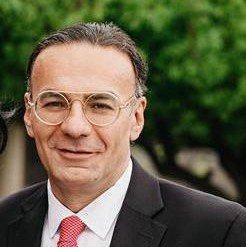
Since 2020 Dr. Arsen Gasparyan has been teaching a number of courses in the fields of International Relations and International Political Economy at the American University of Armenia. From 2014 to 2018 Dr. Gasparyan was involved in teaching and research activities at Miami-Dade College and University of Miami (Florida, USA).
Dr. Arsen Gasparyan served as a Senior Adviser to the Prime Minister of Armenia (2018-2019). He has an extensive background in the field of diplomacy, including high-ranking diplomatic positions in the Ministry of Foreign Affairs of Armenia. From 1993 until 1999 Arsen Gasparyan was a member of the Armenian official delegation to the Nagorno-Karabakh peace process.
Arsen Gasparyan holds a Ph.D. in Political Science from the University of Miami, and his dissertation concerned Energy Diplomacy: The United States of America and the Russian Federation. He has various publications in American, European, Russian, and Armenian periodicals and media.
Dr. Gasparyan is a Converse Bank Board Member since September 1st, 2022.
Education
PhD, International Studies Department, University of Miami, Coral Gables, Florida
Candidate of Political Science, Institute of Philosophy and Law of the National Academy of Science of Armenia and Yerevan State University
BS, Middle Eastern Studies Department, Yerevan State University
Areas of Research and Teaching Specialization
International Relations Theory, International Political Economy, American Politics, Russia and the post-Soviet space, ethnic conflict, and energy (oil and natural gas).
Teaching courses
Ugrad:
- Religion & Politics
- International Relations
- Survey of Regional Politics
- Introduction to U.S. Government
Grad:
- Graduate Seminar on Globalization
- International Political Economy
- Country Risk Analysis
Recent publications
“The Role of Energy in Russian Foreign Policy” in Roger E. Kanet and Dina Moulioukova ed. Russia and the World in the Putin Era: From Theory to Reality in Russian Global Strategy. London-New York: Routledge 2021.
“Understanding the Nagorno-Karabakh Conflict: Domestic Politics and Twenty-Five Years of Fruitless Negotiations 1994-2018.” Caucasus Survey. Volume 7. Issue 3. 2019.

Hovhannes Nikoghosyan specializes in global order and international security, and has keen interest and research experience in human rights and armed conflicts, international criminal responsibility for erga omnes crimes, as well as Responsibility to Protect. He is a graduate of the Russian-Armenian (Slavonic) University with MA in International Relations and PhD in Political Science (2011). Before joining AUA in January 2015, he worked as a Visiting Fellow at the Center for Strategic and International Studies (Washington DC), Magdalena Yesil Visiting Scholar at Sanford School of Public Policy, Duke University (Durham, NC) and has completed an Advanced Certificate Program at the Fletcher School of Law and Diplomacy, Tufts University (Medford, MA). Between May 2017 and April 2018 he served as Aide to the President of the Republic of Armenia. Dr. Nikoghosyan is author of a number of peer-reviewed papers and expert reports published in Armenia and abroad.
Education, Degree
PhD, Russian-Armenian (Slavonic) University (2011)
Visiting Scholar, Duke University (2012-13)
Advanced Certificate Program in Public Administration, Fletcher School of Law and Diplomacy, Tufts University (2014)
Office location
108W, Paramaz Avedisian Building
Email
[email protected]
Office hours
Weds, 10-11am, by appointment
Areas of research and teaching specialization
Human rights in armed conflicts, international security, strategic communications, Responsibility to Protect
Teaching Courses
Ugrad:
- Introduction to Political Science
Grad:
- Research Methods in International Relations
- International Conflicts and Human Rights
- International Relations
- International Conflicts in XXI Century
- Foreign Policy Analysis
- Government, Politics and the Media
Research Activities/Projects
“Foreign policy-making in parliamentary republics: The case of the Republic of Armenia” – AUA Faculty Research Grant (2016-17)
Selected publications
- Hovhannes Nikoghosyan & Vahram Ter-Matevosyan (2022): From ‘revolution’ to war: deciphering Armenia’s populist foreign policy-making process, Southeast European and Black Sea Studies, DOI: 10.1080/14683857.2022.2111111
- Nikoghosyan, (2022). Black garden aflame: the Nagorno-Karabakh conflict in the Soviet and Russian Press. in Southeast European and Black Sea Studies (pp. 1–3). Informa UK Limited. https://doi.org/10.1080/14683857.2022.2095696 [Book review]
- Armen Gevorgyan, Hovhannes Nikoghosyan (2022). Weaponizing religion and potential consequences for European democratic security. Research Report presented to the Parliamentary Assembly of the Council of Europe (36 pages)
- “Great Power Interventions and the Future of Responsibility to Protect”, Valdai Paper #74, August 2017.
- “Armenia after 25 years of Independence: Maintaining Stability in an Unpredictable Neighborhood”, Russian International Affairs Council, December 2016 (book chapter). (Available in AUA Library)
- “Government failure, atrocity crimes and the role of the International Criminal Court: why not Syria, but Libya”, The International Journal of Human Rights, Published online: 30 Sep 2015. DOI:10.1080/13642987.2015.1082838
- “Global problems for global governance”, Valdai Club Report Series, September 2014. (co-authored)
- The Upheavals in Libya and Syria, and Their Impact on “Responsibility to Protect” Doctrine, Turkish Policy Quarterly, Volume 12(1), Spring 2013.
- How to move forward in Nagorno Karabakh after the Four Day War, ELIAMEP Briefing Notes 48/ 2016.
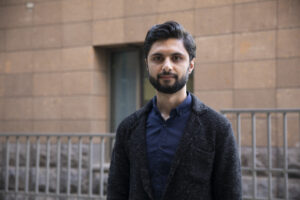
Narek Sukiasyan specializes in foreign and security policy of Armenia and Armenia-Russia affairs. He has received his Dr. Philosophy Degree in Politcal Science and International Relations and Master’s degree from the Yerevan State University and his Bachelor’s degree from Babeș-Bolyai University (Romania). He was an Erasmus Scholarship holder at the Faculty of Political Science at Duisburg-Essen University (Germany, 2016-2017) and at the Faculty of Social Sciences at Charles Univeristy (Czech Republic, 2017-2018). Narek Sukiasyan has published with Armenian and international academic peer-reviewed journals and outlets.
Education
Dr. Philosophy (Politcal Science and International Relations), Yerevan State University, Armenia
MA, Yerevan State University, Armenia
BA, Babeș-Bolyai University, Romania
Office location
117W, Paramaz Avedisian Building
Email
[email protected]
Phone
(+374 60) 61 26 70
Office hours
Thursday 14:30-16:30 pm
Areas of research and teaching specialization
Armenian Foreign Policy, Regional Security, Armenia-Russia affairs, Neo-realism
Courses currently taught
- PSIA103 Introduction to Armenian Government
- FND101 Freshman Seminar 1
- FND102 Freshman Seminar 2
Selected Publications
- Sukiasyan, Narek. “„Wer Appeasement Betreibt, Füttert Ein Krokodil‘.” Osteuropa 73, no. 1-2 (n.d.): 31. doi:10.35998/OE-2023-003.
- Narek Sukiasyan, “EU conflict resolution mechanisms: direct and indirect engagement”, Studia UBB, Europaea, LXII, 4, 2017
- Narek Sukiasyan “The Manifestations of Sunni Radicalism in Azerbaijan”, Scientific Artsakh, No.1 2019, June 2019
- Narek Sukiasyan “Territorial Autonomy and Secession as Strategies of Conflict Management: Case of Nagorno Karabakh” Contemporary Eurasia, National Academy of Sciences of the Republic of Armenia, Vol VII (1). July 2019
- Սուքիասյան Ն․, ՀՀ արտաքին քաղաքականության ռուսական ուղղության վրա ազդող կառուցվածքային գործոնների տեսականացման փորձ և այդ գործոնների ազդեցության էվոլյուցիան, «Գիտական Արցախ» 4 (7), 2020 էջ 61-72։
- Սուքիասյան Ն․, Հայաստանի կառավարող էլիտայի անվտանգային ընկալումները եվ դրանց ազդեցությունը հայ-ռուսական հարաբերությունների վրա 2008-2018 թթ., «Բանբեր Երևանի համալսարանի. Միջազգային հարաբերություններ, քաղաքագիտություն», 12 (2), 2021, էջ 70-81 (2021)։
- Սուքիասյան Ն․, 2008 թ. ռուս-վրացական պատերազմի ազդեցությունը ՀՀ արտաքին և դաշինքային քաղաքականության վրա ներքին-կառուցվածքային եվ գլոբալ-համակարգային չափման մեջ․ նեոռեալիստական հայացք, «Պատմություն և քաղաքականություն», 4 (15), 2021, էջ 138-149։
- Սուքիասյան Ն․, Նեոռեալիզմի և կանստրուկտիվիզմի համատեղելիությունն և կիրառելիությունը ՀՀ արտաքին քաղաքականության ուսումնասիրության հարցում, «Տարածաշրջան և աշխարհ», 6, 2021, էջ 15-20։
- Սուքիասյան Ն․, 2008 թ. ռուս-վրացական պատերազմի ազդեցությունը ՀՀ արտաքին և դաշինքային հարաբերությունների տարածաշրջանային չափման մեջ. Նեոռեալիստական հայացք, «Տարածաշրջան և աշխարհ», 5, 2021, էջ 20-26։
- Սուքիասյան Ն., ՀՀ-ՌԴ հարաբերություններում Հայաստանի արտաքին քաղաքականությունը պայմանավորող նորմերի և ինքնության ձևավորումը․ կոնստրուկտիվիստական հայացք, «Գիտական Արցախ», 4 (11), 2021, էջ 170-185:
- Sukiasyan N., Appeasement and autonomy: Armenian-Russian relations from revolution to war, “European Union Institute for Security Studies”, 2020, 2 pp 1-8.
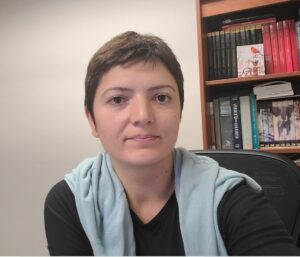
Tatevik Movsisyan specializes in international security studies, conflict and cooperation track, and in research methodology, including formal and empirical methods. She received her PhD in International Studies from Old Dominion University (Norfolk, VA) in 2021. Her doctoral research has focused on international crisis bargaining, particularly, the expected gain- and loss-induced preferences driving the escalation of crises to war. Tatevik Movsisyan was awarded EITM certification, completing the ICPSR and EITM programs (Universities of Michigan and Houston), as well as completed an advanced program at the Fletcher School of Law and Diplomacy (Tufts University). She has previously worked for international organizations such as the Council of Europe and the United Nations in Armenia, in political advisory and strategic programming roles.
Education, Degree
PhD, Old Dominion University
Office location
607 Main Building
Email
[email protected]
Phone
(+374 60) 61 25 81
Office hours
By appointment.
Areas of research and teaching specialization
IR Theory, Security Studies, Nuclear Deterrence, International Organizations, Modeling and Simulation
Courses currently taught
CHSS 183 Statistics for Humanities and Social Sciences
PSIA 101 Introduction to Political Science
PSIA 201 Political Philosophy
Introduction to International Security
Research Activities/Projects
“Situationally induced risk and time preferences” ODU grant led by Jesse Richman.
“Cyber-enabled information operations” as part of the cyber-security project at the Virginia Modeling, Analysis, & Simulation Center (VMASC) led by Jose Padilla.
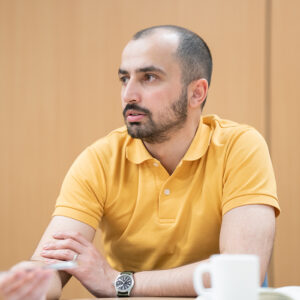
Alen Shadunts specializes in Iran’s foreign affairs, non-western identity in international relations, poststructuralist discourse theory, and conceptual developments at the intersections of International Relations theory and Area Studies. His latest article, “From Knowledge to Wisdom: Uncertainty and Ontological (In)Security in Iran’s Foreign Policy,” has been published by Global Studies Quarterly. Alen holds a DPhil (Ph.D.) in Middle Eastern Studies from the University of Oxford, where he wrote his dissertation on Iran’s foreign policy in the South Caucasus. Alongside his academic endeavors, Alen works at the Democracy Development Foundation (DDF) as a Research and Advocacy Officer.
Education
University of Oxford
DPhil (PhD) Oriental Studies (Modern Middle Eastern Affairs)
London School of Economics and Political Science (LSE)
MSc in International Relations (Research)
American University of Armenia
Master’s in Political Science and International Affairs
Yerevan State University
Bachelor’s in International Relations
Office Location: 607M, AUA Main Building
Email: [email protected]
Office Hours: Fridays 2:00-3:00 pm
Areas of research and teaching specialization
Iranian foreign policy, ontological security, discourse and subjectivity in international relations.
Courses Taught:
PSIA273 Geopolitics of Asia
PSIA272 Geopolitics of Europe
PG203 Qualitative Research Methods
Research Activities
Monograph in Preparation
Shadunts, A. Beyond Pragmatism: Iran’s Foreign Policy in the South Caucasus.
Chapters in Edited Volumes
Shadunts, A. (Upcoming). Political Trauma, Ontological Insecurity, and the 44-Day War. In Social and Political Transformations in Armenia post-2018. Peter Lang Publishing House.
Peer-Reviewed Publications
Shadunts, A. (2023). “From Knowledge to Wisdom: Uncertainty and Ontological (In)security in Iran’s Foreign Policy.” Global Studies Quarterly 3 (3). https://doi.org/10.1093/isagsq/ksad036
Other Publications and Conference Presentations
Shadunts, A. (2021). (Re)interpretinng the Revolution: Iran, the Post-Soviet Moment, and Visions of Regionalism. International Studies Association (ISA) Annual Convention, April 6-9, 2021.
Shadunts, A. (2020). “Outflanked Iran will follow Russia’s lead on Karabakh.” Oxford Analytica, Expert Briefings. https://doi.org/10.1108/OXAN-DB257745
Shadunts, A. (2020). (Re)interpreting the Revolution: Iran and the Post-Soviet Moment. 9th Biennial Oceanic Conference on International Studies, December 7-9, 2020.
Shadunts, A. (2019). Iran and the Armenian Velvet Revolution. Inaugural AUA Political Science and International Affairs Conference, Yerevan, November 14-15, 2019.
Shadunts, A. (2018). Populism, people, and the government in Armenia. EVN Report. Retrieved from: https://goo.gl/Tuj9mE.
Shadunts, A. (2018). What happens when the resistance wins? EVN Report. Retrieved from: https://goo.gl/G5WPFu.
Shadunts, A. (2016). The rational actor assumption is structural realism. E-International Relations. Retrieved from: https://goo.gl/ahxKUs.
Memberships:
International Studies Association (ISA),
British International Studies Association (BISA),
British Society for Middle Eastern Studies (BRISMES),
Association for Iranian Studies (AIS).
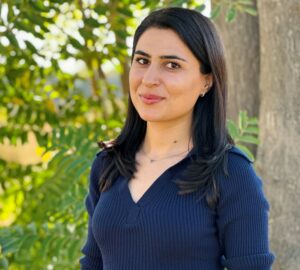
Parandzem Sargsyan is a Senior Product Intelligence Analyst at ServiceTitan Armenia with data analysis, visualization, and reporting expertise. Prior to her current position, she was working as an Institutional Research Manager at AUA with the responsibility of planning, organizing, and implementing the University’s timely data reporting. She holds an MBA degree from AUA and a Bachelor’s degree in Economics from Yerevan State University. Her current research interests include organizational resilience, digital transformation, and business agility.
Courses taught:
- CSE141 – Understanding Data
- CHSS 183 – Statistics for Humanities and Social Sciences
- MGMT 300 – Quantitative Tools for Management
